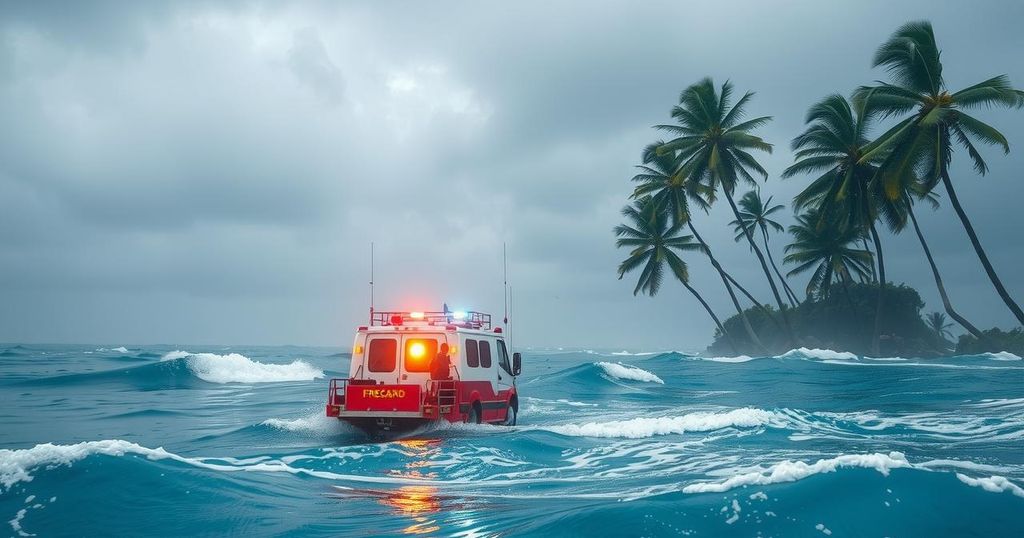Impact of Tropical Cyclone Chido on the Southwest Indian Ocean Region
Tropical Cyclone Chido has significantly impacted the Southwest Indian Ocean region, particularly in Madagascar, Mayotte, Mozambique, and Malawi, resulting in at least 142 casualties and widespread damage. The cyclone’s destructive path has led to extensive humanitarian needs, prompting emergency responses from various organizations, including the Red Cross. The ongoing impacts highlight the necessity for enhanced disaster preparedness and resilience measures.
Tropical Cyclone Chido has emerged as the first significant cyclone this season in the Southwest Indian Ocean, having intensified to category 4 status on December 11, 2022. With wind speeds reaching 220 km/h and central pressures dropping to 929 hPa, Chido has caused severe devastation across multiple countries. By December 22, the cyclone had claimed at least 142 lives, predominantly in Mozambique, Mayotte, and Malawi, with over 3,300 injuries reported.
Madagascar was the first nation to feel the cyclone’s impact, with approximately 135,838 individuals affected. Extensive infrastructure damage occurred, particularly in the Diana Region, where heavy rainfall resulted in flooding and crop loss. Authorities acted swiftly, issuing danger warnings and evacuating vulnerable populations with assistance from the Malagasy Red Cross.
In the Comoros, the government declared a week of mourning after the cyclone’s passage on December 14. The islands of Anjouan and Moheli experienced considerable disruption, with 64,167 individuals affected and complete loss of housing for 171 families. Agricultural losses were widespread, impacting 45 percent of crops.
Mayotte experienced severe consequences, with about 230,000 residents, or 70 percent of the population, affected. Approximately 35,000 homes were obliterated, alongside damages to the main hospital and airport, impeding essential services. Currently, around 100,000 individuals are housed temporarily in inadequate conditions across 70 shelters lacking basic necessities.
Mozambique reported approximately 622,000 individuals impacted by Chido, with Cabo Delgado experiencing the worst damage affecting 509,800 people. Over 130,000 shelters have been damaged or destroyed, exacerbating existing vulnerabilities in this region.
In Malawi, nearly 45,000 individuals are stranded due to flooding and damaged infrastructure. The ongoing assessment aims to reveal the full extent of the destruction, while the National Societies of the Red Cross continue to provide vital humanitarian assistance including search and rescue operations.
The devastation caused by Tropical Cyclone Chido highlights the urgent need for preparedness and resilience against future tropical storms. This Emergency Appeal is designed to allocate necessary resources to support humanitarian efforts and enhance the readiness of National Societies and local volunteers throughout the cyclone season.
The Southwest Indian Ocean region, known for its susceptibility to tropical cyclones, has been experiencing an early and potentially above-average cyclone season. Tropical Cyclone Chido, the first major cyclone of the season, intensified significantly, leading to widespread destruction and loss of life across several nations, including Madagascar, Mayotte, Mozambique, and Malawi. This event has underscored the need for effective emergency preparedness and disaster response measures in light of increasingly severe weather patterns associated with climate change.
In conclusion, Tropical Cyclone Chido has resulted in catastrophic impacts across multiple countries, leading to significant loss of life, injury, and infrastructure damage. The ongoing assessments reveal the urgency for humanitarian relief and preparedness against future threats. Enhanced coordination among international and local agencies, particularly the Red Cross, is vital for effective response and recovery, emphasizing the importance of resilience-building in affected communities.
Original Source: reliefweb.int




Post Comment